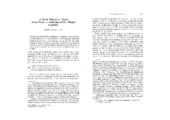A Greek delocutive noun? Some notes on ποίφυγμα and its alleged cognates
Peer reviewed, Journal article
Permanent lenke
https://hdl.handle.net/1956/3878Utgivelsesdato
2001Metadata
Vis full innførselSamlinger
Sammendrag
Delocutives are formed with an utterance (x) as a radical. Common in Greek are verbs meaning "say x" (e.g., πατερίζω); nominal formations denote for instance a person saying x or the utterance x per se. The latter type would explain the hapax ποίφυγμα in A. Th. 280, where Eteocles says, upbraiding a group of women for their hysteria: "do not pray in ποιφύγμασιν". If ποίφυγμα is taken as a delocutive nominal formation from ποῖ φύγω (a Greek cliché), the sense would fit the context as well as Aeschylus' propensity for wordplay.
Utgiver
LexisOpphavsrett
Copyright Lexis. All rights reserved. Reproduced with permission.Lexis
